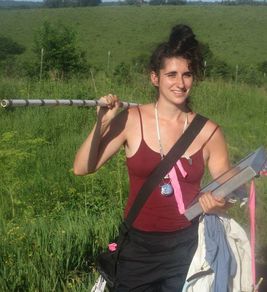 I'm a 2nd year Master's student in the Natural Resources and Environmental Science department at UIUC. My program focuses on applied ecology. We try to identify patterns in nature so that we can use this information to inform conservation practices and management decisions. We often explore patterns before and after a management action is preformed so that we can monitor how the populations of interest responded to the treatment. Why did you choose to become a scientist? I want to intervene on behalf of at-risk plants, animals, and ecosystems to help them survive. Since a young age, I was always disturbed at the wave of extinction of wildlife and the destruction of habitat all over the world, on land and underwater. After I graduated from college, I started working at the Wild Bird Fund, New York City's only wildlife rehabilitation center. My work at the Wild Bird Fund was truly formative, and after working there I came to value birds on a personal level. Therefore I want my career to focus on improving bird species' conservation outcomes and increasing our knowledge about birds and their habitats. What are your current research interests? I research how grassland and shrubland bird populations respond to conservation actions, specifically prescribed burns and cattle grazing, by tracking how bird species' abundances respond (e.g. increase or decrease) to these practices. I also study how prescribed fire and grazing change the larger ecosystem by measuring differences in the vegetation and the fire intensity during the prescribed burns. Broadly, I'm hyper-passionate about bird conservation. I'm also intrigued by an "ecosystem approach" to ecology, where we consider how the entire ecosystem functions so that we can conserve, maintain, or restore ecosystem processes, instead of focusing on species alone. Choose one quality that you think is the most important for making a good scientist. Why? Passion! I think it's important to be passionate about your science projects, because it's important to be driven and self-motivated when conducting your research. Research is a long-game. It takes several years to design, conduct, analyze, and publish. There are limitless knowledge gaps you could contribute to, so take some time to identify your passions and go for it. What advice would you have for aspiring scientists? Don't take everyone too seriously. The field can feel competitive at times, but don't dwell on it. Focus on your own work and stay confident in yourself. Why 500 women scientists? I've joined 500 Women Scientists because there's a history of hundreds of years obstructing women from pursuing science. I think the best way to overcome these barriers is to organize, support each other, and resist.
0 Comments
Leave a Reply. |
AuthorWrite something about yourself. No need to be fancy, just an overview. Archives
March 2018
Categories |
 RSS Feed
RSS Feed
